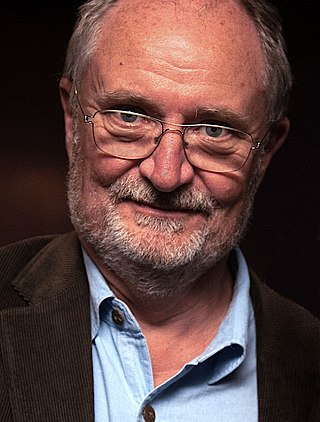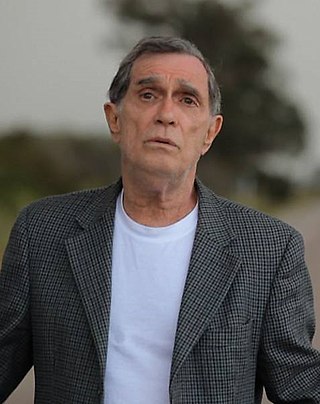A list of films produced in Brazil in 2002 (see 2002 in film):
A list of films produced in Brazil in 2002 (see 2002 in film):

Brazil, officially the Federative Republic of Brazil, is the largest and easternmost country in South America and Latin America. It is the world's fifth-largest country by area and the seventh most populous. Its capital is Brasília, and its most populous city is São Paulo. Brazil is a federation composed of 26 states and a Federal District. It is the only country in the Americas where Portuguese is an official language. Brazil is among the world's most multicultural and ethnically diverse nations, due to over a century of mass immigration from around the world.

Ronaldo Luís Nazário de Lima, mononymously known as Ronaldo, is a Brazilian former professional footballer who played as a striker. He is the owner of Brasileiro Série A club Cruzeiro and owner and president of La Liga club Real Valladolid. Nicknamed O Fenômeno and R9, he is considered one of the greatest players of all time. As a multi-functional striker who brought a new dimension to the position, Ronaldo has been an influence for a generation of strikers that have followed. His individual accolades include being named FIFA World Player of the Year three times and winning two Ballon d'Or awards.

Brazil is a 1985 dystopian science-fiction black comedy film directed by Terry Gilliam and written by Gilliam, Charles McKeown, and Tom Stoppard. The film stars Jonathan Pryce and features Robert De Niro, Kim Greist, Michael Palin, Katherine Helmond, Bob Hoskins, and Ian Holm.
Brazil is the largest country in both South America and Latin America.
2002 in film is an overview of events, including the highest-grossing films, award ceremonies, festivals, a list of country- and genre- specific lists of films released, notable deaths and film debuts. Paramount Pictures celebrated its 90th anniversary in 2002.

Jim Broadbent is an English actor. A graduate of the London Academy of Music and Dramatic Art in 1972, he came to prominence as a character actor for his many roles in film and television. He has received various accolades including an Academy Award, two BAFTA Awards, an International Emmy Award, and two Golden Globe Awards as well as nominations for two Primetime Emmy Awards and a Grammy Award.

City of God is a 2002 Brazilian epic crime film directed by Fernando Meirelles and Kátia Lund. Bráulio Mantovani's script is adapted from the 1997 novel of the same name written by Paulo Lins, but the plot is also loosely based on real events. It depicts the growth of organized crime in the Cidade de Deus suburb of Rio de Janeiro, between the end of the 1960s and the beginning of the 1980s, with the film's closure depicting the war between the drug dealer Li'l Zé and vigilante-turned-criminal Knockout Ned. The tagline is "If you run, the beast catches you; if you stay, the beast eats you."

Fernando Ferreira Meirelles is a Brazilian film director, producer, and screenwriter. He is best known for co-directing the film City of God, released in 2002 in Brazil and in 2003 in the U.S. by Miramax Films, which received international critical acclaim. For his work in the film, he was nominated for an Academy Award for Best Director. He was also nominated for a Golden Globe Award for Best Director in 2005 for The Constant Gardener, which garnered the Academy Award for Best Supporting Actress for Rachel Weisz. He also directed the 2008 adaptation of José Saramago's novel Blindness, and the 2011 film 360. In 2019, Meirelles directed The Two Popes for Netflix.

Jorge Mário da Silva, more commonly known by his stage name Seu Jorge, is a Brazilian musical artist, songwriter, and actor. He is considered by many a renewer of Brazilian pop samba. Seu Jorge cites samba schools and American soul singer Stevie Wonder as major musical influences. Jorge is also known for his film roles as Mané Galinha in the 2002 film City of God and as Pelé dos Santos in the 2004 film The Life Aquatic with Steve Zissou. His musical work has received praise from many of his fellow musicians including Beck and David Bowie.

Sônia Maria Campos Braga is a Brazilian actress. She is known in the English-speaking world for her Golden Globe Award–nominated performances in Kiss of the Spider Woman (1985) and Moon over Parador (1988). She also received a BAFTA Award nomination in 1981 for Dona Flor and Her Two Husbands. For the 1994 television film The Burning Season, she was nominated for an Emmy Award and a third Golden Globe Award. Her other television and film credits include The Cosby Show (1986), Sex and the City (2001), American Family (2002), Alias (2005), Aquarius (2016), Bacurau (2019), and Fatima (2020). In 2020, The New York Times ranked her #24 in its list of the 25 Greatest Actors of the 21st Century.
The term City of God may refer to The City of God, a fifth-century book by St. Augustine of Hippo, and subsequently to the Roman Catholic Church and its unity with civil power, such as existed between it and the Holy Roman Empire in the Middle Ages.

Brazilian cinema was introduced early in the 20th century but took some time to consolidate itself as a popular form of entertainment. The film industry of Brazil has gone through periods of ups and downs, a reflection of its dependency on state funding and incentives.

Matheus Nachtergaele is a Brazilian actor, director, and screenwriter.

Walter Carvalho is a critically and internationally acclaimed Brazilian cinematographer.

Henrique George Mautner, better known by his stage name Jorge Mautner, is a Brazilian singer-songwriter, lyricist, violinist, actor, screenwriter, film director and poet, considered to be a pioneer of the MPB scene and of the Tropicalista movement.

Patricia Gadelha Pillar is a Brazilian actress, producer, film director, screenwriter, and television presenter.

Andrew "Andrucha" Waddington is a Brazilian film director, producer, and screenwriter.
Luciana Maria Arrighi is a Brazilian-born, Australian-Italian production designer. In 1993, she won an Oscar for Best Art Direction for the film Howards End (1992), becoming the first Brazilian-born person to win an Oscar. She also earned two more Oscar nominations in the same category for The Remains of the Day (1993) in 1994, and Anna and the King (1999) in 2000. In 2003, she won the BAFTA Award for Best Art Direction for the television film The Gathering Storm (2002).

The Grande Prêmio do Cinema Brasileiro, more popularly known as the Grande Otelo, is a Brazilian film award given annually by the Brazilian Academy of Cinema. It was established in 2000 as the Grande Prêmio Cinema Brasil by the Ministry of Culture of Brazil that presented it in 2000 and 2001. In 2002, the newly established Academia Brasileira de Cinema took on the role of delivering the award which was then renamed to Grande Prêmio do Cinema Brasileiro.